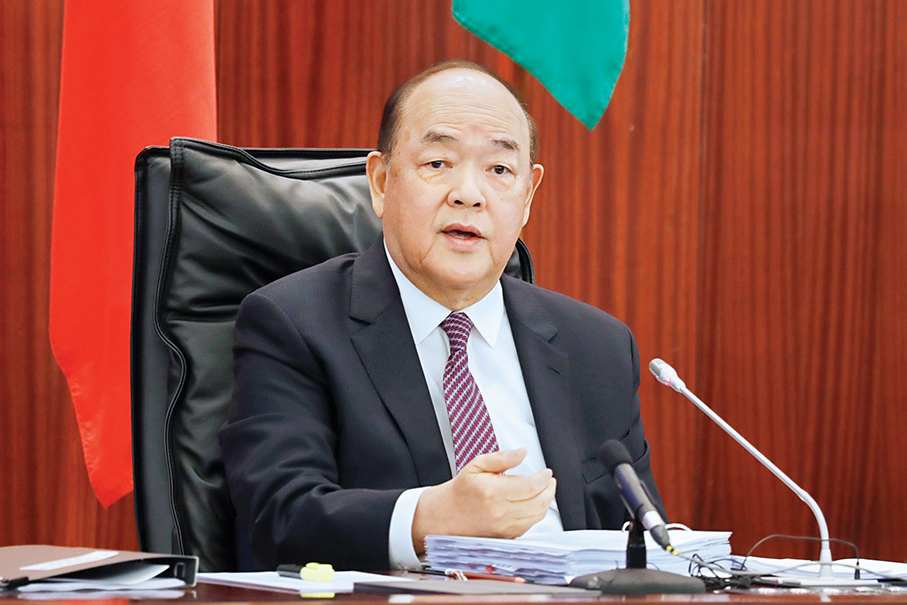Chief Executive Ho Iat Seng says that his government expects to announce details in June about the updated version of its “1+4” model aiming to appropriately diversify Macau’s economy.
Ho said that the government had decided to revise its 1+4 plan, which was drafted last year, because of the city’s new economic landscape that came after the government scrapped almost all COVID-19 border entry curbs early this year.
The local government abandoned its long-running dynamic zero-COVID approach in early December last year.
Ho made the remarks during a Q&A session in the Legislative Assembly’s (AL) hemicycle on Friday.
The 1+4 model was first announced by Ho in November last year when he delivered his 2023 Policy Address to the legislature. According to the 1+4 model, the government will consolidate the development of the city’s tourism and leisure industry while putting special emphasis on promoting the development of four new key industries, namely 1) big health, 2) modern finance, 3) high-tech, and 4) conventions and exhibitions as well as culture and sports.
Ho revealed during Friday’s Q&A session that Secretary for Economy and Finance Lei Wai Nong had completed drafting the government’s 1+4 plan in August last year. Ho noted that Macau was still affected by the COVID-19 pandemic in the last few months of last year, during which the local government was also carrying out its tender for granting the city’s new gaming concessions, pointing out that the government has required the new gaming concessionaires to strengthen their investments in non-gaming facilities and services.
The city’s six new gaming concessions, which are scheduled to run for 10 years, started on January 1 this year.
Consequently, Ho said, the government had decided to “wait and see” at that time by not announcing details of the first draft of its 1+4 plan, because of the then uncertainty about the city’s economic prospects.
Ho noted that Macau lifted almost all COVID-19 border entry curbs early this year, while the six gaming concessionaires submitted their respective non-gaming investment plans last month, because of which, Ho said, Macau’s current economic landscape is different to last year’s when the government drafted its 1+4 plan.
Consequently, Ho said, the government now needs to revise its 1+4 plan considering the city’s latest economic development landscape as well as the six gaming operators’ non-gaming investment plans, adding that the government now aims to announce details of the revised version of its 1+4 appropriate economic diversification plan in June.
The chief executive underlined that the general 1+4 framework will remain unchanged in the revised version.
Ho to visit Luxembourg to study bond issuing
Meanwhile, Ho also said during Friday’s Q&A session that he will visit Luxembourg later this month to study the grand duchy’s issuing of bonds and secondary market.
Ho will pay a five-day working visit to Portugal from tomorrow to Saturday.
Ho said that Macau’s development of a bond market has been faster than initially expected thanks to the mainland authorities’ strong support, but he underlined that the city’s bond market is still in an embryonic state.
Ho said that during his visit to Luxembourg which Lei will also join, he will promote the issuing of renminbi-denominated bonds in Macau. The chief executive noted that Luxembourg is the world’s largest secondary bond market.
The chief executive also said that he will promote the business potential of the Guangdong-Macau In-depth Cooperation Zone in Hengqin during his trip to Portugal. He also reaffirmed that the local government is planning to hold Macau’s first trade expo between China and Portuguese-speaking countries (PSCs) later this year.
The Guangdong-Macau In-depth Cooperation Zone in Hengqin is colloquially known as in-depth cooperation zone.
Ho also said that he expected the initial integration of financial services between Macau and the in-depth cooperation zone to be completed in 2025 and to be consolidated by 2035.
Govt’s drive to attract foreign visitors
Meanwhile, Ho also acknowledged that Macau’s tourism industry had been hard hit by the three-year COVID-19 pandemic. Macau has fully reopened its border to the world for around three months, because of which, Ho said, the city’s tourism sector would still need time to fully recover.
Ho said that airports in the world are still being affected by a lack of staff in the aftermath of the three-year COVID-19 pandemic, because of which the operation capacities of the affected airports have now only returned to around 50 percent of the pre-pandemic level.
Consequently, Ho said, the predicament is making it difficult for Macau to expand its international passenger air routes.
Ho acknowledged that Macau is affected by its shortcoming of only having international air routes with East Asian and Southeast Asian countries, because of which international tourists from other countries eager to visit Macau need to fly to Hong Kong first before coming here. The chief executive said that the local government has strengthened its promotion campaign for Macau’s tourism at Hong Kong’s airport.
Macau should welcome all types of visitors
Meanwhile, Ho also underlined that Macau’s civil society should not classify tourists as high-end or low-end ones. All those visiting Macau are guests, the chief executive said, adding that Macau should not only welcome high-end visitors but also any visitors.
Ho said that normal tour groups are unable to afford to stay at five-star hotels, urging the city’s hotel sector to put stronger emphasis on investing in the development of three-star and four-star hotels. Ho also said that he was eager to see the local hotel sector renovate older three-star and four-star hotels.
This year’s timing of cash handout returns to pre-pandemic one
Meanwhile, Ho also underlined that this year’s annual wealth-sharing handouts will be paid to residents in July, the same arrangements as in pre-pandemic years.
During the three-year COVID-19 pandemic from 2020 to last year, the government started to pay its annual cash handout in April with the aim of alleviating residents’ financial hardship resulting from the pandemic’s adverse impact on the local economy.
The government’s annual cash handout covers local residents, irrespective of age and nationality. The amount of this year’s cash handout remains unchanged at 10,000 patacas for permanent and 6,000 patacas for non-permanent residents.
Residential project in Hengqin
Meanwhile, Ho also said that home sales in the Macau New Neighbourhood (MNN) residential project in Hengqin would start in the second half of this year, adding that a school in the neighbourhood would comprise kindergarten and primary school education first.
The MNN project consists of 27 residential towers, the topping-out of which was completed at the end of last year. Its residential units are earmarked for certain eligible groups of Macau residents to purchase. The project, which is slated to be completed in the second half of this year, also features commercial facilities as well as various social service and community facilities, including a school.
The MNN project is being developed by Macau Urban Renewal Limited (MUR), which is owned by the Macau government.
Ho said on Friday that the Macau government is aiming for the construction of another building in the neighbourhood earmarked for secondary school education.
Ho also said that the MNN flats are of “very high” quality.

Chief Executive Ho Iat Seng answers questions from lawmakers during Friday’s Q&A session in the Legislative Assembly’s (AL) hemicycle. – Photo: GCS







